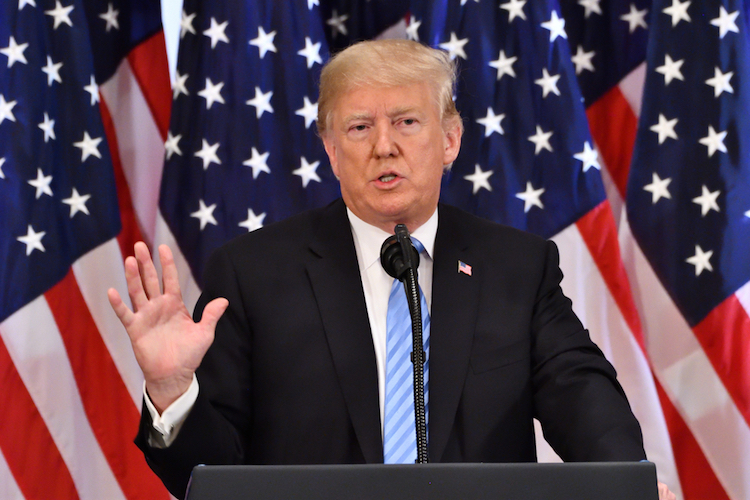Legal experts question legitimacy of Trump’s order limiting social media platforms

President Donald Trump in 2018. Photo from Shutterstock.com.
Legal experts are weighing in on President Donald Trump’s move to curtail protections for social media, expressing skepticism that it would actually be enforced or survive judicial scrutiny.
After Twitter labeled two of his tweets as “potentially misleading,” Trump signed an executive order Thursday that seeks to reinterpret Section 230 of the Communications Decency Act, which protects websites from liability for publishing third-party content and also allows them to moderate content. According to a report from CNN, several experts contend the order not only violates the First Amendment, but it also pushes federal agencies to circumvent Congress and legal precedent.
Reuters, National Law Journal, Washington Post, NPR and NBC News have more coverage.
Robert McDowell, a former Republican commissioner at the Federal Communications Commission, told CNN that by attempting to establish new rules for how social media companies moderate content, the president’s order risks violating those companies’ own free speech protections. He said that since social media companies are private entities, they receive the same protections as individuals.
Jameel Jaffer, executive director of the Knight First Amendment Institute at Columbia University, echoed those concerns in a statement Thursday, saying Trump’s order is an attempt “to intimidate technology companies from using tools that are indispensable to protecting the integrity of public discourse online.”
“The order was born unconstitutional because it was issued in retaliation for Twitter’s fact-checking of President Trump’s tweets,” Jaffer added. “Some of its provisions raise additional constitutional concerns, since they seem to contemplate that the government will investigate and punish internet service providers for decisions that are protected by the First Amendment.”
Trump’s draft order, as reported by the National Law Journal, asks the FCC to clarify the rules. Any complaints related to censorship by social media companies would be directed to the Department of Justice and Federal Trade Commission, and it would fall to the FTC to determine if there was a violation of the law.
Andrew Schwartzman, senior counselor at the Benton Institute for Broadband and Society, argued to CNN that the Trump administration is attempting to rewrite Section 230 without the approval of Congress. He said the order’s “directives to the FCC are preposterous, but at the same time, horrifying.”
Tiffany Li, a technology attorney and visiting clinical assistant professor at Boston University School of Law, also said on Twitter that “if I’m reading this correctly, the EO claims tech platforms are doing something they’re not, in violation of an incorrect interpretation of law, and tasks agencies it can’t task to look into the things that aren’t being done that wouldn’t be wrong.”
According to Reuters, legal experts argue that even if the FCC agrees to reinterpret Section 230, its regulations won’t have a binding legal effect on the judges who consider alleged violations of the law.
Daphne Keller, director of the Program on Platform Regulation at Stanford University’s Cyber Policy Center, told Reuters that for this reason, the order “is 95% political theater—rhetoric without legal foundation, and without legal impact.”
Other legal experts, including Kate Klonick, an assistant professor at St. John’s University School of Law who focuses on internet law, told Reuters that the president’s order contradicts court decisions that have upheld Section 230 of the Communications Decency Act in favor of technology companies.
Klonick said that “a lot of the executive order is bluster” and “it basically casts aside 25 years of judicial precedent.”
She added that the FCC may struggle with Trump’s order since “it is unclear they are going to want to do something in which they would obviously get smacked down by a court order.”



